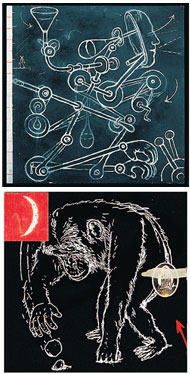
Today's nytimes.com has a good article on the current status of the free will debate.
Are free will and determinism compatible, or incompatible?
Do persons have "free will?"
If persons do not have free will certain problems arise. To conclude this, it seems, undermines a lot of things, to include theorizing about the nature of free will and determinism. And, if free will is just an "illusion" then the idea that persons are morally "responsible" for their actions seems to be incoherent. The article states: "The death of free will, or its exposure as a convenient illusion, some worry, could wreak havoc on our sense of moral and legal responsibility. According to those who believe that free will and determinism are incompatible, Dr. [Michael] Silberstein said in an e-mail message, it would mean that “people are no more responsible for their actions than asteroids or planets.” Anything would go."
Daniel Dennett says “when we consider whether free will is an illusion or reality, we are looking into an abyss. What seems to confront us is a plunge into nihilism and despair.”
But then Dennett says that "the belief that the traditional intuitive notion of a free will divorced from causality is inflated, metaphysical nonsense, Dr. Dennett says reflecting an outdated dualistic view of the world.
Rather, Dr. Dennett argues, it is precisely our immersion in causality and the material world that frees us. Evolution, history and culture, he explains, have endowed us with feedback systems that give us the unique ability to reflect and think things over and to imagine the future. Free will and determinism can co-exist.
“All the varieties of free will worth having, we have,” Dr. Dennett said."
I think it may be well and good to say that, but explaining it is another matter. It may be that the problem of free will is, in principle, impossible to explain on a theory of philosophical materialism. If everything is ultimately reducible to matter and it various collocations, then what we call "free will" can also, in principle, be so reduced. But that seems undermining of moral responsibility as well as truth-seeking as it relates to theorizing about free will. That's the nihilism and despar thing Dennett mentions, and it follows logically from materialistic reductionism.
Finally, some admit that "free will" is a jaw-dropping "problem." "Opinions vary about whether it will ultimately prove to be physics all the way down, total independence from physics, or some shade in between, and thus how free we are. Dr. Silberstein, the Elizabethtown College professor, said, “There’s nothing in fundamental physics by itself that tells us we can’t have such emergent properties when we get to different levels of complexities.”
He waxed poetically as he imagined how the universe would evolve, with more and more complicated forms emerging from primordial quantum muck as from an elaborate computer game, in accordance with a few simple rules: “If you understand, you ought to be awestruck, you ought to be bowled over.”"